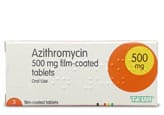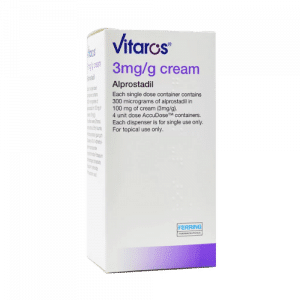
Azithromycin Tablets: An effective antibiotic for the rapid treatment of travelers’ diarrhea and other bacterial infections. Azithromycin works by halting the growth of bacteria, providing relief from symptoms within 24 hours when started at the onset of diarrhea. Recommended for adults planning to travel to remote areas or those at risk of severe illness from diarrhea. This medication should be taken as directed and is not intended for preventive use. Note: Not suitable for individuals with certain medical conditions or allergies to similar antibiotics.
Azithromycin
£13.99
Product Information
Azithromycin is effective in reducing the symptoms of travellers’ diarrhoea, particularly if taken with loperamide. This is an off-label use of azithromycin, but it has been prescribed for travellers’ diarrhoea for many years. The symptoms of travellers’ diarrhoea should improve within 24 hours of starting the antibiotic.
It is recommended that you consider carrying standby antibiotics for travellers’ diarrhoea:
- If you are going to a remote location with little or no access to good medical assistance.
- If you are at high risk of diarrhoea leading to severe illness, e.g. poorly controlled diabetes, renal impairment, heart failure, reduced CD4 HIV or other reduced immunity.
- If you have a pre-existing bowel problem where infection may trigger a relapse, e.g. ulcerative colitis, Crohn’s disease, coeliac disease, and previous bowel surgery.
- If you have a known tendency to severe travellers’ diarrhoea.
Dosage
Treatment with azithromycin is 500mg daily for 3 days (either 2 x 250mg or 1 X 500mg tablets). Start as soon as you get diarrhoea, not before. It is not a preventative.
Cautions
If you have a known allergy to azithromycin, erythromycin, or clarithromycin you should not take azithromycin for travellers’ diarrhoea.
There are some medical conditions where you should not take azithromycin:
- A tendency to irregular heartbeat or other heart disease.
- Myasthenia gravis.
- Liver disease.
- Kidney disease.
It is not recommended to take azithromycin when trying to conceive, or during pregnancy and breastfeeding, without first discussing with your own GP. See Best use of medicines in pregnancy – Azithromycin for further information.
Azithromycin tablets contain lactose.
Other medicines
There are several medications which should not be used at the same time as azithromycin. Not many of them are prescribed frequently so most people should be able to use it. Consult your own GP if taking:
- Ciclosporin – for reducing immunity after transplant.
- Digoxin – for irregular heart or heart failure.
- Ergotamine – for migraine used rarely.
- Terfenadine – antihistamine for hay fever and allergy.
- Theophylline – for asthma is used rarely.
- Disopyramide, Amiodarone, Sotalol or other medication for irregular heart.
- Rifabutin – an anti-tuberculosis antibiotic used rarely
- Promethazine (including Avomine) – NOT to be taken at the same time as azithromycin.
- Colchicine – for gout and familial Mediterranean fever.
- Warfarin, edoxaban, ticagrelor, or any similar medicines – to prevent blood clots.
- Talazoparib, topotecan – specialist cancer drugs.
- Antidepressant or antipsychotic medication.
- Quinolone antibiotics, e.g. moxifloxacin, levofloxacin, ciprofloxacin.
- Antacids – for indigestion, azithromycin can be taken but leave at least 2 hours after taking the antacid.
There is a very rare theoretical risk of abnormal heart rhythm if azithromycin is taken at the same time as some other medications – please check this list.
Side effects
If there are any side effects the most common are stomach upset, headache, nausea, and diarrhoea. For more details see the patient information leaflet supplied with the tablets.
Seeking help
Symptoms should start to improve within 24 hours of starting azithromycin. Medical advice should be sought if symptoms are not improving after 2 or 3 days, or are worsening, or if any of the following occur:
- Profuse diarrhoea and vomiting lead to dehydration.
- Blood and green or yellow slime in the motions with severe abdominal pains.
- Diarrhoea is associated with rashes.
- High fever and headache with diarrhoea (particularly in malarial areas).
Managing the symptoms of diarrhoea
- The antidiarrhoeal loperamide can also reduce symptoms.
- Try to get plenty of rest.
- Drink plenty of fluids, even if vomiting (at least 3-4 litres daily).
- Continue to eat simple foods such as rice and dried bread, appetite permitting.
- Pay attention to personal hygiene, to prevent spread.
Related Products
-
Erectile dysfunction medication
Eroxon ED Treatment Gel – 4 Pack
Rated 0 out of 5£25.00 Add to basket -
-
-




